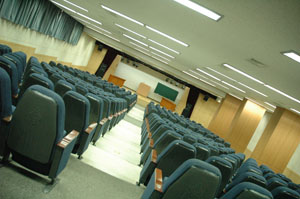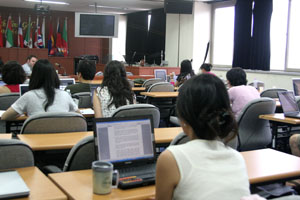What’s going to happen to this new lawyer-selection system?
ON JULY 13, *“Law of establishment and operation of law school”* was enacted. Many people wonder why the issue has suddenly arisen. Moreover, now students who entered Col. of Law to become lawyers and judicial officers are confused. The current bar exam, which is generally known as *sashi,* had such a big influence on students. Passing the exam was considered as winning a successful life, since a person could live his/her life within the judiciary, a job that almost everyone respects. Still, there are many problems in this *sashi* system, which led to the change in the lawyer-selection system.
An alternative to the troublesome *sashi*
The bar exam, which is generally known as *sashi,* is a current lawyer-selecting system that Korean society has administered for decades. However, the judiciary and academics have been discussing *sashi*’s shortcomings and inadequacies for decades as well. To begin with, this is a “one-time forever system” which means, one exam can change a person’s whole life. “Most students pay all their attention to passing the test, not knowing exactly when or even how it will end. People believe that they will be able to gain both honor and wealth after passing the exam, since they obtain a powerful status as a member of judiciary as well as earning respect from other people. Thus, people believe that this event ? passing the *sashi* - can totally differentiate their lives from other people’s lives,”says Prof. Kim Ki-chang (Col. of Law, Korea Univ.).
In addition, the *sashi* system does not help students focus on their university classes. In order to pass the *sashi,* he/she only has to prepare for the exam, regardless of his/her GPA(Grade Point Average)s or other abilities. “Of course, school lectures are helpful, but since my GPA does not matter much in *sashi,* I tend to focus relatively less on school studies,” says one student from Col. of Law in Korea Univ. More than half of the students in Col. of Law study for *sashi,* and this phenomenon makes school education become merely a means used to pass the exam.
Last but not least, because the test is open to students of all kinds of majors, non-major students can also become a lawyer without a proper, or sufficient education. The problem also lies in the “one-time-forever system.” Since *sashi* decides which people become a lawyer without looking at the students’ overall abilities, unlike its purpose, it is rather hard to measure the extent of legal knowledge of both legal-major and non-major students. In the case of non-major students, the problem becomes even worse. The only gateway they should enter is *sashi,* whether or not they had taken the regular school education. “Many people would agree that there is a problem when people pass the exam without taking medical classes. Since the job is specialized, letting a non-major become a lawyer is similar, since the job is specialized,” claims Kim. For decades, *sashi* system has become an issue to be reformed. To solve these problems of *sashi,* formation of a law school system has risen.
 | ||
The merits of law school education
1. Normalization in both undergraduate and graduate schools
The overall improvement of college education system is what many of the professors are expecting from the new law school system. To begin with, since GPA becomes one of three measures - GPA, foreign language, and LEET (Legal Education Eligibility Test)- to enter law school, students will care more about their GPAs in undergraduate school. Therefore students’ attitudes towards school studies should also change in a positive way.
To enhance the education quality of the law school, a Legal Education Committee will be formed before this September; it will act to evaluate the overall quality of education, facilities, and organization of law schools through regulation. Due to these regulations, it can be assumed that the quality of law education will be maintained at a high level.
2. Diversity among lawyers
Since law school is a graduate school, students’ different backgrounds on undergraduate major should help when studying the law, making it a synergy. “I majored in international languages, and I was interested in the IR (International Relations). I feel that it is helpful to apply my basis on IR when studying American law in which I am interested ,” explains Bae Myung-hoon (2nd sem.) from Handong International Law School- a law school in Pohang which educates students who want to become international lawyers. “In our law school, there even are people who are majored in piano - these people can be powerful when they specialize in the entertainment law. Meeting these people and discussing with those who now study in law school but have different majors allow me to learn about other people and about ways of communicating with various kinds of people,” adds Jung So-young, a director of Dept. of External Affairs at Handong Univ. For the lawyers who passed *sashi* with different majors, qualification of their education as a lawyer and their abilities seems unclear. In the new law school system, however, possessing a different background is rather helpful, since entering law school means a whole new start. Together with the basics of undergraduate education, these people learn about the law from the same starting point.
Another merit of a law school education is that with the new system, students can study a variety subjects within the broader field of law. For example, if a person wants to work for a company after graduation, he/she can focus on studies regarding trade and contracts. Moreover, considering the fact that law school curriculum is not restricted to learning and memorizing just laws, it gives students chances to have many experiences, such as mock conferences, internships, or even volunteer activities.
3. An opportunity to educate global leaders
The new law school system does not just mean a change of the lawyer-selecting system. Looking further, the law school can be a means of educating leaders in the global society. “These days, globalization is a natural trend and international trades are held everywhere. Korea, however, still maintains studying Korean law and sticking to the domestic legal market,” criticizes Won Jae-chun, Prof., from Handong International Law School. “A global lawyer who feels free to use foreign languages, understands foreign law and contracts is the lawyer we need in today’s society,” he asserts. Although there are some subjects about comparative law or foreign law in Col. of Law, there are only few classes offering this material. Thus, Korea has to rely on foreign lawyers or Korean lawyers who have certificate in American law. With the advent of law schools, which have a curriculum that educates lawyers with knowledge in international law, Korean lawyers will also be able to deal with international contracts and trials more easily.
 | ||
Issues left to be resolved
Although the PCJR (Presidential Committee on Judiciary Reform) had tried its best to make a reasonable system, there still are problems to be solved. From the students’ perspective, there is a problem with expensive tuition fees. “Today, under the *sashi* system, it seems possible for many people to accomplish their hopes to become lawyers without paying an enormous amount of money only if they study hard to pass the exam. However, under the new system, they need one more substance, money. Since the tuition fee goes up to ₩20~30 millions per year, people who don’t have much money will suffer from financial shortages,” says Song Ki-min ([an alias], a student preparing for *sashi*).
However, for the tuition fee, scholarships, grants and loans can become solutions. The graduates from each university could raise funds to support exceptional students. In addition, the government will provide 90 million in loans until graduation. Giving scholarships, together with the budget currently used for JRTI (Judicial Research and Training Institute) can also become another way.
While the problem of tuition fees is a problem that could be solved, there are problems that are still in the process of being solved. The main issue of enacted law these days the admission quota of the law school because it decides the form of teaching within the law schools. According to the new implementing ordinance in August, there will be no more than 150 students in one law school although the admission quota may vary from school to school. Some people worry that the number of student is too small to initiate customized lectures. “If there is not enough students to open a lecture, it will be hard to have a variety of lectures. It may become a barrier to produce lawyers with diverse specialties,” says Hong bok-ki (Dean, Col. of Law).
Some experts also point out that although the government is ready to start the law school program by 2009, many people are still not ready for the adoption of the proposed law school program. “There sure will be confusion to adapt this new system, since the school curriculum should be totally changed,” says Lee Kwan-hee (President of Korean Constitutional Law Association).
Not only the universities, but also students who entered the Col. of Law or who are preparing for the *sashi* are also worried. There are communities on websites designed to prepare for the LEET (Legal Education Eligibility Test), although the form of LEET has not yet been decided. “Though there is only one year to prepare for the LEET, we cannot find a reliable way to study for law school since there are no guidelines concerning the test,” complains one student in the LEET explanatory lecture held by one of the *sashi* academies in Shinlim-dong.
 | ||
| ▲ Students are studying in Handong International Law School |
To overcome the previously stated problems, the best solution that both the government and universities can do is to prepare for this change as quickly as possible. For government, it is urgent to choose the best universities, to establish trustworthy guidelines for the law school program, and to make a viable LEET format. Once the universities are chosen, strict guidelines for law school curriculum are critical. “In fact, how the curriculum works is another important point for the law school system to consider. The curriculum should have classes to produce global lawyers, and it also should be concise enough to have both theoretical and practical education aspects within a three year program,” insists Won.
It is true that there will be a great deal of confusion within the legal education field for several years. After some period of chaos that Korea decided to move through, people will be able to enjoy an enhanced Korea with more international lawyers in the society, who can contribute to better legal services and improved national competence. At the end of the tunnel of chaos, this confusion may provide a light, producing better legal services and better-educated global leaders.

